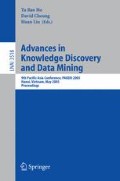Abstract
The discovery of frequent patterns has attracted a lot of attention in the data mining community. While an extensive research has been carried out for discovering positive patterns, little has been offered for discovering patterns with negation. An amount of frequent patterns with negation is usually huge and exceeds the number of frequent positive patterns by orders of magnitude. The problem can be significantly alleviated by applying the generalized disjunction-free literal sets representation, which is a concise lossless representation of all frequent patterns, both with and without negation. In this paper, we offer new efficient algorithm GDFLR-SO-Apriori for discovering this representation and evaluate it against the GDFLR-Apriori algorithm.
Access this chapter
Tax calculation will be finalised at checkout
Purchases are for personal use only
Preview
Unable to display preview. Download preview PDF.
References
Agrawal, R., Imielinski, T., Swami, A.: Mining Associations Rules between Sets of Items in Large Databases. In: Proc. of the ACM SIGMOD, Washington, USA, pp. 207–216 (1993)
Agrawal, R., Mannila, H., Srikant, R., Toivonen, H., Verkamo, A.I.: Fast Discovery of Association Rules. In: Advances in KDD, pp. 307–328. AAAI, Menlo Park (1996)
Kryszkiewicz, M.: Generalized Disjunction-Free Representation of Frequent Patterns with Negation. In: JETAI, pp. 63–82. Taylor & Francis Group, UK (2005)
Kryszkiewicz, M.: Reasoning about Frequent Patterns with Negation. Encyclopedia of Data Warehousing and Mining. Information Science Publishing, Idea Group, Inc. (in print)
Kryszkiewicz, M., Gajek, M.: Concise Representation of Frequent Patterns based on Generalized Disjunction-Free Generators. In: Chen, M.-S., Yu, P.S., Liu, B. (eds.) PAKDD 2002. LNCS (LNAI), vol. 2336, pp. 159–171. Springer, Heidelberg (2002)
Mannila, H., Toivonen, H.: Multiple Uses of Frequent Sets and Condensed Representations. In: Proc. of KDD 1996, Portland, USA, pp. 189–194 (1996)
Toivonen, H.: Discovery of Frequent Patterns in Large Data Collections. Ph.D. Thesis, Report A-1996-5, University of Helsinki (1996)
Author information
Authors and Affiliations
Editor information
Editors and Affiliations
Rights and permissions
Copyright information
© 2005 Springer-Verlag Berlin Heidelberg
About this paper
Cite this paper
Kryszkiewicz, M., Cichoń, K. (2005). Support Oriented Discovery of Generalized Disjunction-Free Representation of Frequent Patterns with Negation. In: Ho, T.B., Cheung, D., Liu, H. (eds) Advances in Knowledge Discovery and Data Mining. PAKDD 2005. Lecture Notes in Computer Science(), vol 3518. Springer, Berlin, Heidelberg. https://doi.org/10.1007/11430919_77
Download citation
DOI: https://doi.org/10.1007/11430919_77
Publisher Name: Springer, Berlin, Heidelberg
Print ISBN: 978-3-540-26076-9
Online ISBN: 978-3-540-31935-1
eBook Packages: Computer ScienceComputer Science (R0)

